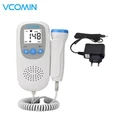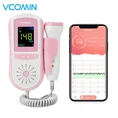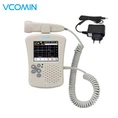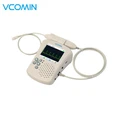1. Introduction
Pregnancy is an emotional journey, from the first fetal movement to the first heartbeat. For many expectant parents, hearing their baby's heartbeat for the first time is a memory they'll treasure forever. But this magical sound isn't limited to clinic visits. That's why more and more families are choosing to use a home fetal doppler – so they can stay connected to their baby anytime, anywhere, from the comfort of their own home.
But here's the big question: Is it really safe to use a fetal doppler at home?
What do doctors say? How can you be sure the products you use are safe and medically approved?
This article explores what fetal detectors do, how they work, and what leading medical experts have to say about the safe and responsible use of handheld fetal dopplers.

2. What is fetal doppler?
A fetal doppler is a handheld ultrasound device that can hear a fetal heartbeat by detecting sound waves that bounce off the fetal heart. These devices are similar to those used in hospitals and OB/GYN clinics, but are smaller and easier to use for personal use.
Most home use heart rate dopplers include:
Transducer probe
Audio output or built-in speaker
Optional LCD display to show heart rate (bpm)
Lightweight and portable design
These devices can usually detect a heartbeat around 12 weeks of pregnancy, but results can vary depending on the position of the fetus, the location of the placenta, and the size of the mother.

3. Why more and more parents choose home doppler fetal heart rate monitor
Home doppler devices are growing in popularity thanks to both emotional and practical benefits:
Emotional comfort hearing your baby's heartbeat in real time can be reassuring, especially for parents who have experienced a miscarriage or pregnancy complications.
Family bonding the home fetal doppler allows fathers, siblings and even grandparents to share in the joy and build early connections before the baby is born.
Convenient, no need to wait weeks for an appointment? With a home doppler, parents can check at any time.
Global accessibility manufacturers like Vcomin Technology Limited have widely provided certified, high-quality equipment, exported to more than 100 countries, and ensured safety through FDA, CE, ISO13485 and NMPA certifications.
4. Is it safe to use a fetal doppler at home?
The short answer is: yes – as long as it is used responsibly.
The low-intensity ultrasound waves emitted by fetal dopplers are considered safe for occasional, short-term use according to the U.S. Food and Drug Administration (FDA), and the American Institute of ultrasound in medicine (AIUM) has also stated that there are no known harmful effects when used appropriately within medical guidelines.
"Within medical guidance, there are no known harmful effects of diagnostic ultrasound use." – AIUM
However, overuse or misinterpretation may lead to false reassurance or unnecessary stress. Always follow medical advice.
5. Medical guidelines and expert opinions
Most medical professionals agree that home fetal dopplers should be used as a supplement to professional prenatal care, not as a replacement.
Pro Tip:
Wait until 12 weeks of pregnancy before using
Limit to once or twice a week
Each meeting should be limited to 10 minutes
If you are concerned or cannot detect a heartbeat, contact your doctor
The American college of obstetricians and gynecologists (ACOG) warns against using a doppler to self-diagnose fetal health, noting that only trained professionals should interpret fetal health.
6. How to use a handheld fetal doppler correctly
To ensure that you use a home fetal doppler safely and successfully, follow these steps:
Apply a generous amount of ultrasound gel to the lower abdomen.
Lie down and relax in a quiet room.
Turn on the device and slowly move the probe across your abdomen.
Gently tilt the probe at different angles until you hear a heartbeat.
Distinguish your heartbeat from your baby's - your baby's heart rate is usually between 120-160 beats per minute. Once you find it, listen briefly and turn the device off after a few minutes.
TIP: Don't panic if you can't find a heartbeat right away – positioning and fetal movement can make a difference.
7. What not to do: Common mistakes and misunderstandings
Although home fetal doppler is safe, there are some key mistakes to avoid:
❌ Do not use the device more than once a day
❌Don't assume everything is ok just because you hear the sound
❌Don't panic if you don't find a heartbeat right away
❌ Do not use unregulated or uncertified products from unknown sellers
Misreading may delay necessary medical care or cause unnecessary worry. When in doubt, always consult your healthcare provider.
8. Choose a safe and certified doppler device for home use
Not all devices are created equal. When choosing a fetal doppler for home use, look for the following certifications:
FDA approved (USA)
CE Mark (EU)
ISO 13485 (Quality System)
NMPA registered (China)
Vcomin is a trusted name in medical manufacturing, providing high-precision, ergonomic handheld fetal dopplers with over 15 years of R&D experience and excellent regulatory certifications. Its devices are exported worldwide and praised by thousands of parents for their reliability and ease of use.

9. Final Thoughts
Using a fetal doppler at home is a wonderful way to bond with your baby and gain peace of mind between prenatal checkups. When used appropriately and correctly, it is a safe and enjoyable experience.
remember:
✅It is not a diagnostic tool
✅It should never replace healthcare
But it can provide memorable moments of connection
10. Find a Fetal doppler Device You Can Trust
Thinking of trying a home doppler? Choose a trusted, certified brand that puts safety and accuracy first.
Why choose Vcomin?
More than 15 years of experience in medical device innovation
FDA, CE, ISO13485, NMPA certified
Exported to more than 100 countries around the world
Clear sound quality, ergonomic design
Explore our Fetal doppler range,Contact us for a consultation




